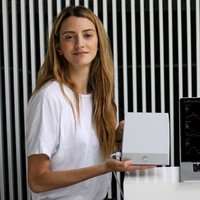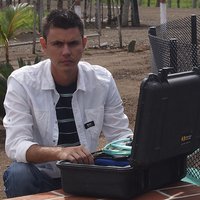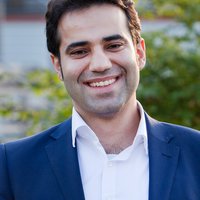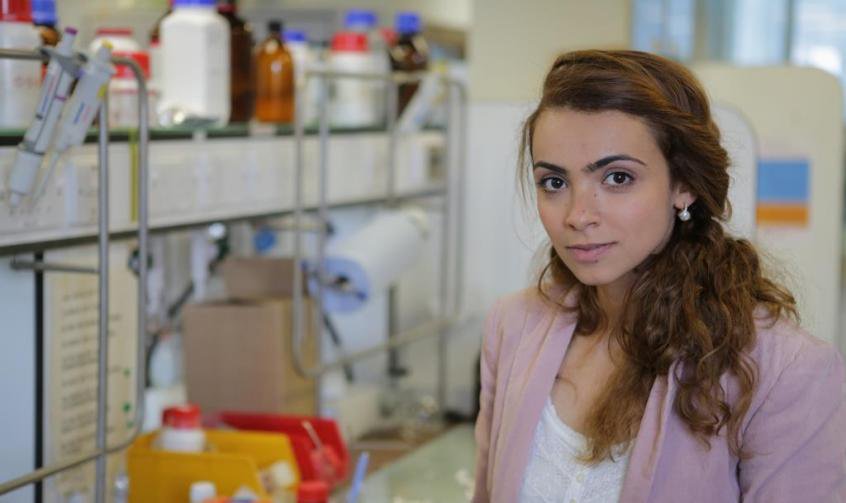Access to the electrical grid is still not a part of everyday life for 1.2 billion people worldwide, and this is particularly the in developing countries in sub-Saharan Africa and Asia. Many others suffer frequent outages and blackouts which negatively impact their quality of life and hinder their economic development. To guarantee a stable supply, especially in critical infrastructures like hospitals, Enass Abo-Hamed is developing a new energy storage system designed to leverage the potential and availability of renewable energy sources. Thanks to her work in this field, this young researcher has been named as one of MIT Technology Review, Spanish edition´s. Innovators Under 35 Europe 2017.
This PhD in chemistry from Cambridge University and researcher at the Imperial College of London (both in United Kingdom) has developed smart nanomaterials capable of storing porous, solid-state hydrogen at room temperature and without the need to pressurize the gas. Abo-Hamed then designed system, called Off-Grid Plug & Play Power (OG3p), which incorporates these novel storage materials.
One of the primary advantages of these materials is that they react to thermal changes to selectively retain or unleash hydrogen. At room temperature, these materials absorb the hydrogen and store it in a sponge-like structure. Simply heating the environment will trigger the collapse of the porous structure and "push" the hydrogen out. "This allows the system to be used on demand," the young innovator explains, adding: "If we return to room temperature, the structure of the storage sponge will expand again and adopt a storage state." This transition from a storage state to liberation can be repeated over and over again, like a light switch. Once released, the hydrogen is sent to a fuel cell which converts it into electricity.
Abo-Hamed´s current prototypes do not yet produce enough energy, but, according to her calculations, the final product could generate up to 200 kW of power – enough to power a hospital during a temporary blackout. This device will be the size of shipping container with three separate compartments. In the first, electrolyzers use energy absorbed and converted by solar panels to break down water molecules into hydrogen and oxygen atoms. In the second, the storage materials absorb the hydrogen and retain it within a sponge-like structure. The third would contain a fuel cell, which will only be used to satisfy peaks in demand through the application of a low heat source to free the stored hydrogen and allow it to flow towards the fuel cell to be transformed into electricity.
Abo-Hamed´s device, therefore, works like a battery though, according to its creator, it would be more cost-efficient than batteries or diesel-burning generators, which are the most common current alternatives for powering off-grid installations. Diesel is dirty and more expensive long term, and batteries are not an optimal solution due to their low storage capabilities, short battery range and elevated price, according to Abo-Hamed. "Sometimes it is cheaper to squander solar energy than to pay [to store]", she points out.
Through her start-up, H2GO Power, this young innovator in designing a system for areas where access to the grid is lacking or limited. To this end, she has signed collaboration agreements with the company SMAP Energy, which offers energy usage data monitoring within buildings, and with the ESUT Hospital in Enugu (Nigeria), where only 45% of the population has access to the grid, according to data from the International Energy Agency. Abo-Hamed plans to roll her OG3P units out after completing pilot tests in the United Kingdom.
The director of the air conditioning, heating, gas supply and air protection department at the Technical University of Breslavia (Poland) and jury member for the Innovators Under 35 Europe 2017, Renata Krzyżyńska, is "truly impressed" by Abo-Hamed´s work. This expert concludes: "I firmly believe that her technology has the potential to transform the existing hydrogen storage solutions already on the market.
By Elena Zafra
Translation: Teresa Woods




